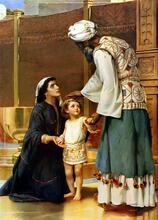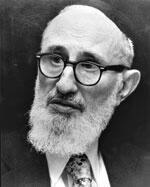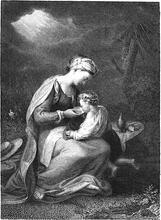Rebekah: Bible
The second (after Sarah) of the matriarchs in the ancestor stories of Genesis, Rebekah is one of the most prominent women—in terms of her active role and her control of events—in the Hebrew Bible. The beautifully constructed narratives in Genesis 24–27 describe how she becomes Isaac’s wife, gives birth to twin sons after initial barrenness, and finally obtains the primary place in the lineage for her younger son, Jacob, who is destined to become ancestor of all Israel. Although problematic to some, her deception in manipulating Isaac for Jacob’s benefit contributes to her portrayal as an admirable and assertive woman.
The Rebekah Narrative
The story of the wooing of Rebekah unfolds in Genesis 24, the longest chapter in the Book of Genesis. A spouse for Isaac is to be obtained from his uncle Nahor’s family; the ensuing cousin marriage, with Rebekah and Isaac both members of the same kinship group, serves to emphasize the importance of their lineage. Abraham dispatches a trusted but unnamed servant to Mesopotamia, the land of his birth and where some of his family still resides, to find a wife for his son. Rebekah secures her role as wife-elect for Isaac by befriending the servant and his ten camels in the famous well scene, which has been called a type-scene—a narrative episode with certain expected motifs that appears at the critical juncture in the life of a hero. Indeed, the account of Rebekah at the well is the premier biblical example of such a scene. It ostensibly draws attention to Isaac, but, in his absence, reveals the beauty and especially the virtues of his wife-to-be.
After the well incident, Rebekah brings the servant home, enters into the marriage arrangement, and sets off to meet her future husband. She seems to have some input into the marriage negotiations, or at least into the decision about her departure from her homeland and birth family (24:57–58). When she first sees Isaac in Gen 24:62–65, she dismounts from her camel and veils herself, a nonverbal act perhaps signaling her status as a soon-to-be betrothed woman as it does for elite women in ancient Assyria. That she dons the betrothal veil herself may also indicate her independence. Once she arrives in the promised land, she enters Isaac’s home (called “his mother Sarah’s tent,” 24:67). There she is “loved” (24:67) by her husband, the first woman in the Hebrew Bible for whom marital love is proclaimed.
After twenty years of marriage, when Rebekah fails to become pregnant, Isaac prays to God, who grants the prayer that she may conceive. Another type-scene, that of the barren wife, thus enters the Rebekah story, calling attention to the special role of the children ultimately born to her. A divine oracle is addressed to her when she is pregnant; God proclaims that “two nations” are in her womb and will contend with each other (25:23). This oracle foreshadows the tensions that will characterize the relationship between her sons, Jacob and Esau, as figures in the Genesis narrative and as eponymous ancestors of Israel and Edom.
In the next episode in the Rebekah story, Isaac passes her off as his sister. This narrative, similar in many ways to two such accounts about Sarah, at first seems to contribute little to the role or character of Rebekah. However, it does differentiate her in a significant way from Sarah; in one of the two wife-sister episodes in which she figures (Gen 12:13–14, 19), Sarah seems to have had sexual relations with Pharaoh to ensure the safety of her husband and their household, although this is not the case in the second wife-sister story involving Sarah (Gen 20: 1–8). Rebekah’s marital fidelity, in contrast, is never compromised (Gen 26:7–11). Her relationship with her husband is consistently monogamous, unlike the other matriarchs of Genesis: Sarah, who provides her husband with the slave wife Hagar and perhaps has extramarital sex with the pharaoh; and Rachel and Leah, who are co-wives and also provide slave wives to Jacob.
Rebekah’s Deceptions
The final scene in which Rebekah appears is another well-known biblical episode: Isaac blesses Jacob rather than Esau, the first to emerge from the womb and thus the expected recipient of the paternal blessing (Genesis 27). The designation of Jacob as heir to the ancestral lineage, which means he will be progenitor of all Israel, is orchestrated by Rebekah. She covers Jacob with animal skins so that when the vision-impaired Isaac touches Jacob, he thinks he is touching Esau, who is hairy (Gen 24:25). Isaac then gives his blessing to Jacob rather than first-born Esau. Through clever manipulation, whereby Isaac is deceived, she achieves her purpose and controls the family destiny. Moreover, in another ruse, she convinces Isaac to send Jacob to her family in Padan-Aram (in Mesopotamia) to preclude his marrying a Hittite woman when in fact she wants him to escape a vindictive Esau (Gen 27:41--46; 28:1–5). Rebekah will never see her beloved son again.
Rebekah’s behavior—in securing the birthright for her favored son Jacob and in protecting him from Esau’s wrath by having him sent away—is sometimes seen as problematic. A few male commentators, ignoring frequent instances of deceit by male heroes and the positive role of tricksters in ancient folklore, aver that deceitful women like Rebekah subvert biblical values. Similarly, some post-biblical sources (e.g., Josephus) elevate Isaac’s role and reduce Rebekah’s. Yet the biblical text is clear about God’s intention to have Jacob continue the lineage. Thus, by suggesting the ruse that achieves this, Rebekah is carrying out God’s will. Indeed, Jewish tradition in general elevates her, considering her a righteous woman and even a prophet. As a resourceful trickster, Rebekah serves God and preserves the ancestral lineage.
Evaluating Rebekah
Evaluating Rebekah’s role in the biblical story of pre-Israelite ancestral beginnings has evoked varying perspectives. Two millennia of Jewish and Christian biblical interpretation have focused largely on the male ancestors—the patriarchs Abraham, Isaac, and Jacob. Furthermore, virtually all scholarly studies and Bible textbooks, until very recently, designated the pre-Mosaic era as the patriarchal period, thereby providing an inherent male bias to any consideration of the family stories of Genesis. That bias rightly reflects the biblical concern with patrilineage—tracing families through the male line. Yet it obscures the fact that those family stories include strong female characters, the matriarchs.
This is especially true for Rebekah, whose position in the second generation of ancestors is actually more prominent than that of her spouse. Rebekah is far more dynamic and proactive than Isaac, for whom no independent episode is reported. The very fact that the verb to go is used of Rebekah seven times (a number used in the Bible for emphasis) in the courtship narrative of Genesis 24 highlights her active character. In addition, Rebekah’s behavior in Genesis 24 is depicted by a series of action verbs—she runs, draws water, fills jars, and rides a camel—that contribute to a sense of her individuality and vitality in contrast to Isaac’s passivity. Moreover, she is the only matriarch to receive a direct message from God (although Abraham’s slave wife Hagar also receives an oracle); she “inquires” of God, who answers her (Gen 25: 22– 23). Also noteworthy is that the language used in reference to Rebekah’s journey from Mesopotamia to Canaan, and in anticipation of her role as progenitor of countless offspring, echoes that found in the Abraham narratives (compare Gen 24:4, 38, 60 with Gen 12:1 and 22:17). Furthermore, Rebekah is said to have had a nurse (Gen 35:8), a highly unusual circumstance in the Hebrew Bible and one that thus signifies her unusual stature. Finally, the long courtship account of Genesis 24, which is considered by many to be a self-contained novella, can perhaps be called a woman’s story. Rebekah’s dynamic presence in that episode may indicate its origin in women’s storytelling, as do certain other features. The term “mother’s household,” for example, appears in 24:28. That phrase is found only four times in the Hebrew Bible, all in texts that reveal women’s lives and agency. It signifies the important role of the senior woman in a family household, at least when considered from a female perspective, as does the use of the phrase “his mother Sarah’s tent” for Isaac’s home.
Because of the centrality of Rebekah, in contrast to Isaac, the ancestral sequence might more accurately be called Abraham, Rebekah, and Jacob. Indeed, when Rebekah’s favored son, Jacob, is sent to Mesopotamia to secure a spouse and escape from Esau, he identifies himself to his future bride (and cousin) Rachel not as the son of Isaac, but rather as “Rebekah’s son” (Gen 29:12); his paternal ancestry is eclipsed by Rebekah’s lineage. This incident may signify a reality of maternal dominance, at least in the case of Rebekah, that is too powerful for the androcentric interests of biblical narrative to obscure
Adelman, Rachel. “Reading Rebekah Unveiled.” In The Female Ruse: Women's Deception and Divine Sanction in the Hebrew Bible, 11–37. Sheffield: Sheffield Phoenix Press, 2015.
Alter, Robert. The Art of Biblical Narrative. New York: Basic Books, 1981.
Engar, Ann W. “Old Testament Women as Tricksters.” The Bucknell Review 33 (1990): 143–157.
Frymer-Kensky, Tikva. “The Hand That Rocks the Cradle: The Rivka Stories.” In Reading the Women of the Bible: A New Interpretation of Their Stories, 5–23. New York: Schocken Books, 2002.
Niditch, Susan. “The Three Wife-Sister Tales of Genesis.” In A Prelude to Biblical Folklore: Underdogs and Tricksters, 23–69. San Francisco: Harper & Row, 1987.
Schneider, Tammi J. “Rebekah.” In Mothers of Promise: Women in the Book of Genesis, 41–62. Grand Rapids, MI: Baker Academic, 2008.
Sasson, Jack M. “The Servant's Tale: How Rebekah Found a Spouse.” Journal of Near Eastern Studies 65 (2006): 241-265.
Simkovich, Malka Z. “Rebecca’s Character.” TheTorah.com. Published November 15, 2017, Last Updated January 9, 2021. https://thetorah.com/article/rebeccas-character
Stansell, Gary. “Mothers and Sons in Ancient Israel.” In “Ihr Völker alle, klatscht in die Hände!” Festschrift für Erhard S. Gerstenberger Zum 65. Geburstag, edited by Rainer Kessler et al., 269–290. Münster, Germany: Lit Verlag, 1997.
Teugels, Lieve. “‘A Strong Woman Who Can Find?’ A Study of the Characterization in Genesis 24 with Some Perspectives on the General Presentation of Isaac and Rebekah in the Genesis Narrative.” Journal for the Study of the Old Testament 63 (1994): 89–104.










